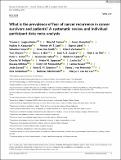What is the prevalence of fear of cancer recurrence in cancer survivors and patients? A systematic review and individual participant data meta-analysis
Abstract
Objective Care for fear of cancer recurrence (FCR) is considered the most common unmet need among cancer survivors. Yet the prevalence of FCR and predisposing factors remain inconclusive. To support targeted care, we provide a comprehensive overview of the prevalence and severity of FCR among cancer survivors and patients, as measured using the short form of the validated Fear of Cancer Recurrence Inventory (FCRI-SF). We also report on associations between FCR and clinical and demographic characteristics. Methods This is a systematic review and individual participant data (IPD) meta-analysis on the prevalence of FCR. In the review, we included all studies that used the FCRI-SF with adult (≥18 years) cancer survivors and patients. Date of search: 7 February 2020. Risk of bias was assessed using the Joanna Briggs Institute critical appraisal tool. Results IPD were requested from 87 unique studies and provided for 46 studies comprising 11,226 participants from 13 countries. 9311 respondents were included for the main analyses. On the FCRI-SF (range 0–36), 58.8% of respondents scored ≥13, 45.1% scored ≥16 and 19.2% scored ≥22. FCR decreased with age and women reported more FCR than men. FCR was found across cancer types and continents and for all time periods since cancer diagnosis. Conclusions FCR affects a considerable number of cancer survivors and patients. It is therefore important that healthcare providers discuss this issue with their patients and provide treatment when needed. Further research is needed to investigate how best to prevent and treat FCR and to identify other factors associated with FCR. The protocol was prospectively registered (PROSPERO CRD42020142185).
Citation
Luigjes-Huizer , Y L , Tauber , N M , Humphris , G , Kasparian , N A , Lam , W W T , Lebel , S , Simard , S , Smith , A B , Zachariae , R , Afiyanti , Y , Bell , K J L , Custers , J A E , de Wit , N J , Fisher , P L , Galica , J , Garland , S N , Helsper , C W , Jeppesen , M M , Liu , J , Mititelu , R , Monninkhof , E M , Russell , L , Savard , J , Speckens , A E M , van Helmondt , S J , Vatandoust , S , Zdenkowski , N & van der Lee , M L 2022 , ' What is the prevalence of fear of cancer recurrence in cancer survivors and patients? A systematic review and individual participant data meta-analysis ' , Psycho-Oncology , vol. Early View . https://doi.org/10.1002/pon.5921
Publication
Psycho-Oncology
Status
Peer reviewed
ISSN
1057-9249Type
Journal item
Description
This study was supported by the Dutch Cancer Society (KWF) grant number 10936.Collections
Items in the St Andrews Research Repository are protected by copyright, with all rights reserved, unless otherwise indicated.

